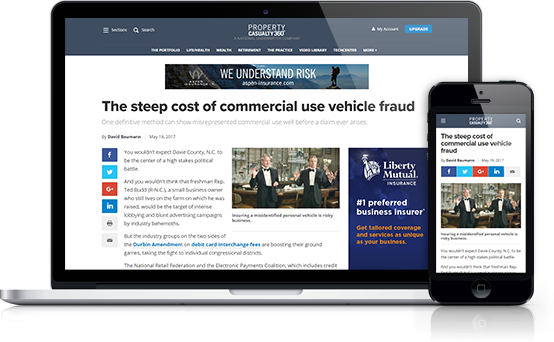Recommended Stories
Nearmap’s AI-powered models approved in 27 markets
Insurers can leverage the predictive scores to help price risk.
7 Steps to unlocking success in insurance M&A
Here's why user-experience integration is key to a successful deal.
People on the move in the P&C insurance industry: November 8, 2024
The latest insurance-industry personnel news from Price Forbes, Aon, Sedgwick and more.
Resource Center

Assessment
Sponsored by AgentSync
Distribution Channel Management Assessment
Navigating today’s insurance landscape requires more than instinct. Assess the strengths and gaps in your distribution strategy with this comprehensive tool. Discover actionable insights to refine operations, enhance data quality, ensure compliance, and scale efficiently. Evaluate your current capabilities and see where you stand across five crucial areas. Start building a more resilient and agile network today.

Article
Sponsored by TruStage
Filling the Middle-Market Life Insurance Gap in America
The mid-market life insurance segment holds tremendous potential, with 39% of consumers planning to buy life insurance in the next year (1). This white paper explores the unique opportunities for you to scale your mid-market segment and drive sustainable growth.

eBook
Sponsored by The Society of Insura-Preneurs
Struggling with all the noise around "modern marketing"? Don’t have a clear roadmap for growth? Too busy to figure it all out? Michael Jans, the “Godfather of Modern Insurance Marketing,” has distilled 27 years of experience into a simple, powerful guide that cuts through the clutter and delivers real results.
PropertyCasualty360

Don’t miss crucial news and insights you need to make informed decisions for your P&C insurance business. Join PropertyCasualty360.com now!
- Unlimited access to PropertyCasualty360.com - your roadmap to thriving in a disrupted environment
- Access to other award-winning ALM websites including BenefitsPRO.com, ThinkAdvisor.com and Law.com
- Exclusive discounts on PropertyCasualty360, National Underwriter, Claims and ALM events

 Copyright © 2024 ALM Global, LLC. All Rights Reserved.
Copyright © 2024 ALM Global, LLC. All Rights Reserved.











